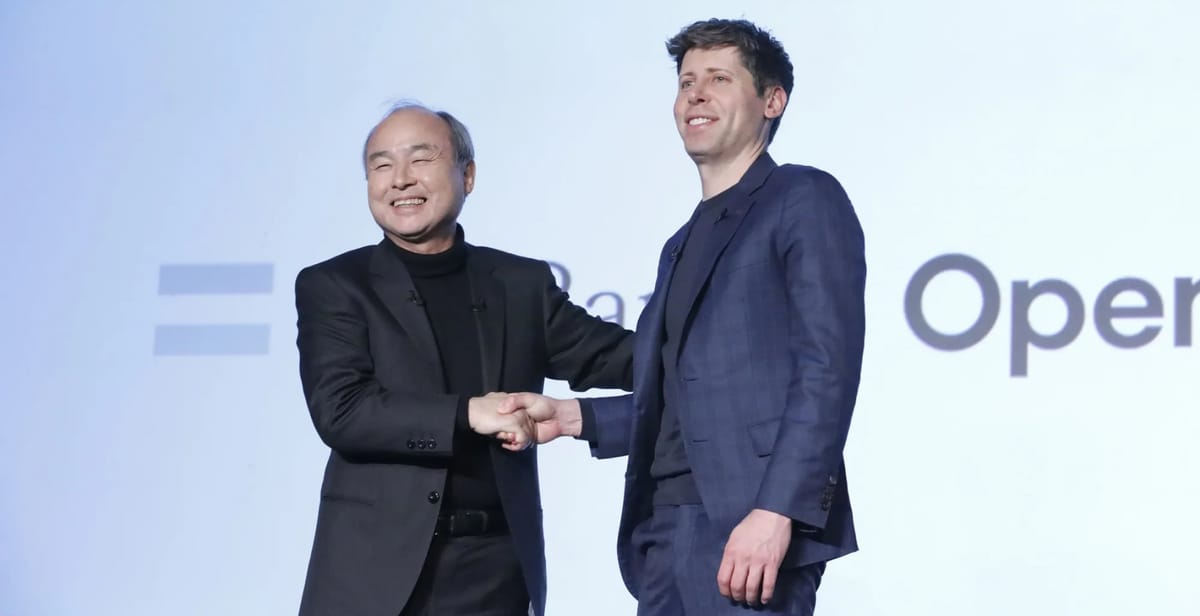OpenAI has closed a staggering $40 billion funding round, valuing the ChatGPT maker at $300 billion. This deal—led primarily by SoftBank with participation from Microsoft, Coatue, Altimeter, and Thrive—stands as the largest private tech fundraise in history.
Key Points
- SoftBank will invest an initial $10B, with remaining $30B contingent on OpenAI converting to for-profit by end of 2025
- SoftBank plans to syndicate $10B to co-investors, reducing its effective commitment to $30B
- $18B earmarked for OpenAI's Stargate infrastructure project
- ChatGPT now reaches 500 million weekly users, with revenue projected to triple to $12.7B this year
The capital influx comes as OpenAI reveals that ChatGPT now serves 500 million weekly users, up from 400 million just last month. The company says this funding will enable them to "push the frontiers of AI research even further, scale our compute infrastructure, and deliver increasingly powerful tools" to their expanding user base.
About $18 billion of the funding is reportedly earmarked for OpenAI's ambitious Stargate infrastructure project, a joint venture with SoftBank and Oracle announced earlier this year that aims to establish a network of AI data centers across the United States.
SoftBank has disclosed the details of their two-stage investment structure. The first closing of $10 billion is scheduled for April, valuing OpenAI at a pre-money valuation of $260 billion. The second closing of up to $30 billion is planned for December 2025, but comes with significant conditions.
Importantly, for SoftBank to commit the full $30 billion in the second round, OpenAI Global—the for-profit subsidiary of OpenAI, Inc.—must complete "a recapitalization of its economic waterfall" by the end of 2025 or early 2026. If these conditions aren't met, SoftBank's second investment would be reduced to just $10 billion.
SoftBank also says that it plans to syndicate up to $10 billion of the total investment to co-investors, making its effective commitment up to $30 billion. The initial $10 billion investment in April will be financed through borrowings from financial institutions including Mizuho Bank.
Masayoshi Son, SoftBank's founder and CEO, appears to view this investment as central to his company's mission. In its announcement, SoftBank declared its mission is "to realize Artificial Super Intelligence (ASI) for the advancement of humanity" and positioned OpenAI as "its most important partner" on this journey.
This massive vote of confidence from investors comes as OpenAI projects its revenue will triple to $12.7 billion by year's end, and amid recent executive reshuffling that will see CEO Sam Altman shifting focus toward research and product development while COO Brad Lightcap expands his role to oversee business operations.
The deal's size dwarfs previous private funding records, including Ant Group's $14 billion raise in 2018 and Juul Labs' $12.8 billion the same year. It positions OpenAI's valuation behind only SpaceX ($350 billion) among private companies, according to CB Insights data.
For context, OpenAI began in 2015 as a nonprofit research lab co-founded by entrepreneurs including Elon Musk, who has since challenged the company's moves toward a for-profit structure in court. The organization currently operates under a hybrid structure with a capped-profit limited partnership created in 2019, with the original nonprofit serving as the controlling shareholder.
The financing not only reinforces OpenAI’s position in the competitive AI landscape but also sets the stage for its ongoing evolution from a research lab to a more commercially viable enterprise.

